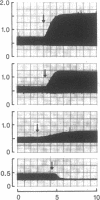Abstract
Stretching of the atrial wall is a known stimulant for atrial natriuretic peptide (ANP) secretion. Little is known about other factors that may influence ANP secretion. We examined the effects of the neurotransmitters of the autonomic nervous system on ANP secretion from isolated rat left atria. Superfusion with 10 muM norepinephrine produced a biphasic rise in ANP secretion with a peak response 2.5-fold above baseline secretion. To determine whether the response to norepinephrine primarily reflected alpha- or beta-adrenergic receptor stimulation, atria were superfused with 0.1 muM isoproterenol or 10 muM phenylephrine and 1 muM propranolol. ANP secretion in response to isoproterenol was biphasic, similar to the response to norepinephrine. Phenylephrine evoked a monophasic ANP secretory response, which was delayed in onset relative to that of isoproterenol or norepinephrine. Superfusion with 10 muM methacholine alone had no effect on ANP secretion, but rapidly attenuated norepinephrine-stimulated secretion by 67%. From these observations we conclude: (a) Both alpha- and beta-adrenergic agonists directly and distinctively stimulate ANP secretion; (b) Norepinephrine stimulates ANP secretion by both alpha- and beta-adrenergic mechanisms, however the secretory response pattern of norepinephrine reflects a predominence of beta-adrenergic activity; (c) Under basal conditions, methacholine does not influence ANP secretion; and (d) Methacholine inhibits norepinephrine-stimulated ANP secretion. Thus, in vivo, activation of the sympathetic nervous system may enhance ANP secretion, whereas a rise in parasympathetic tone may lower ANP secretion.
Full text
PDF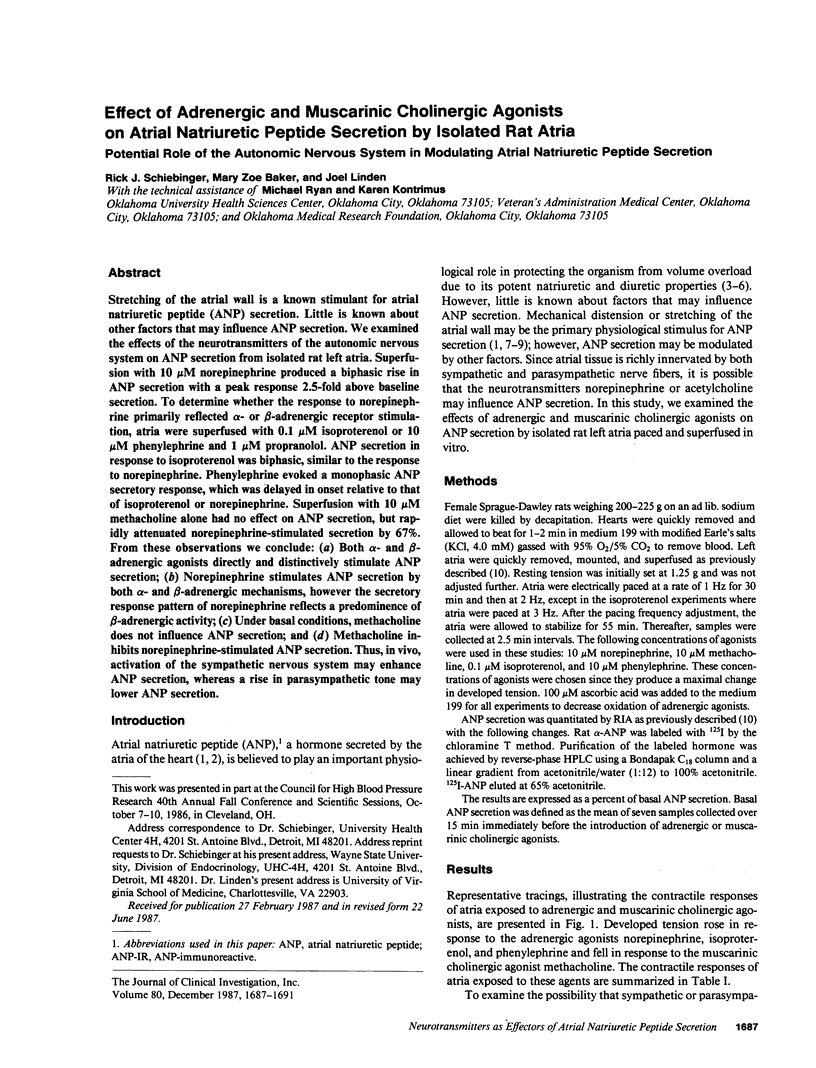
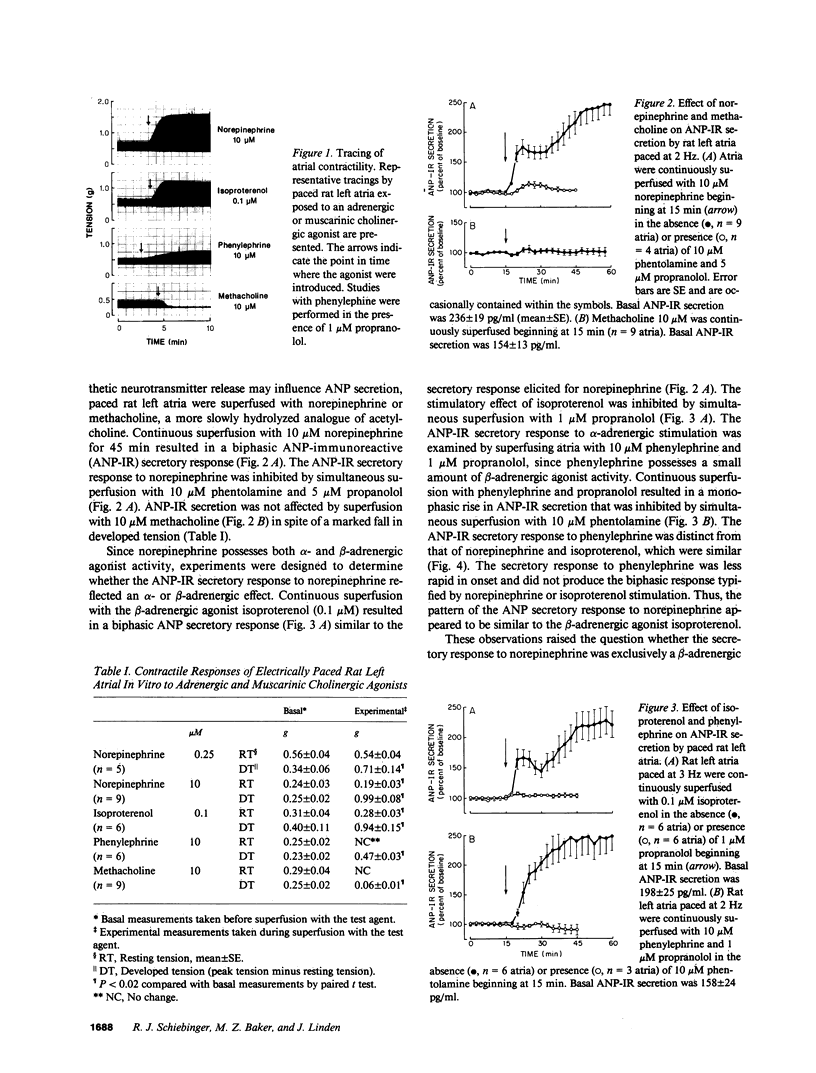
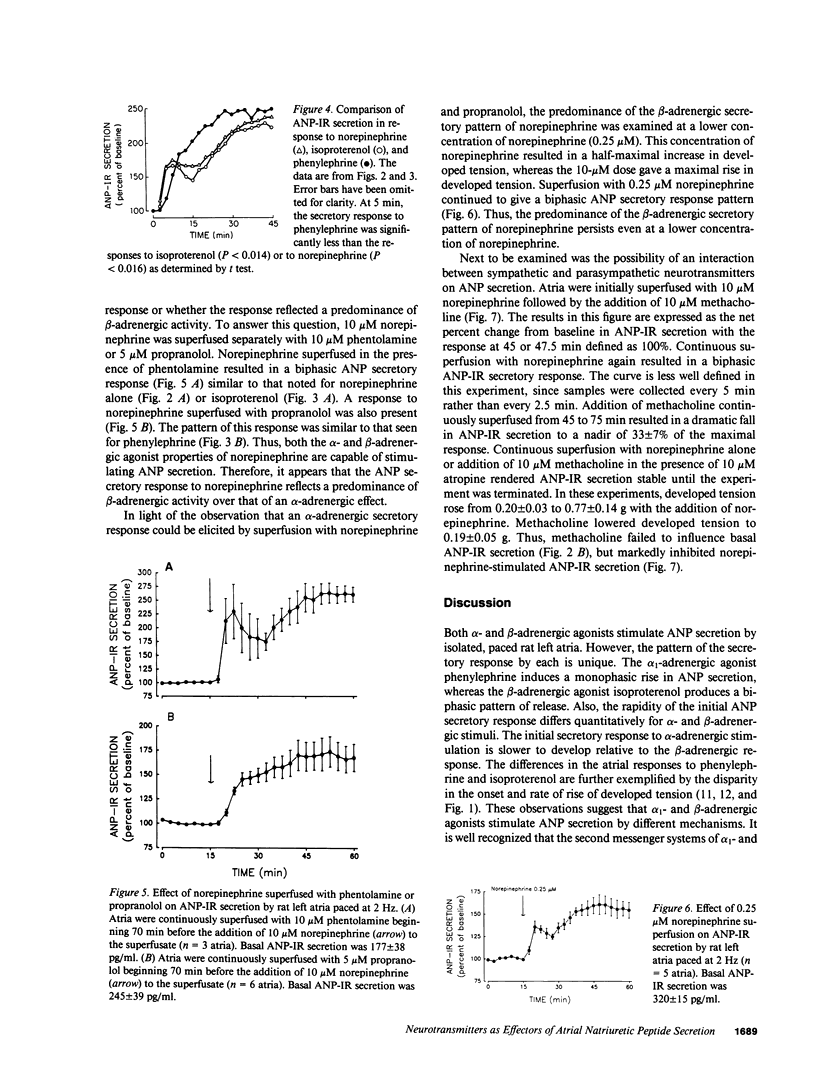
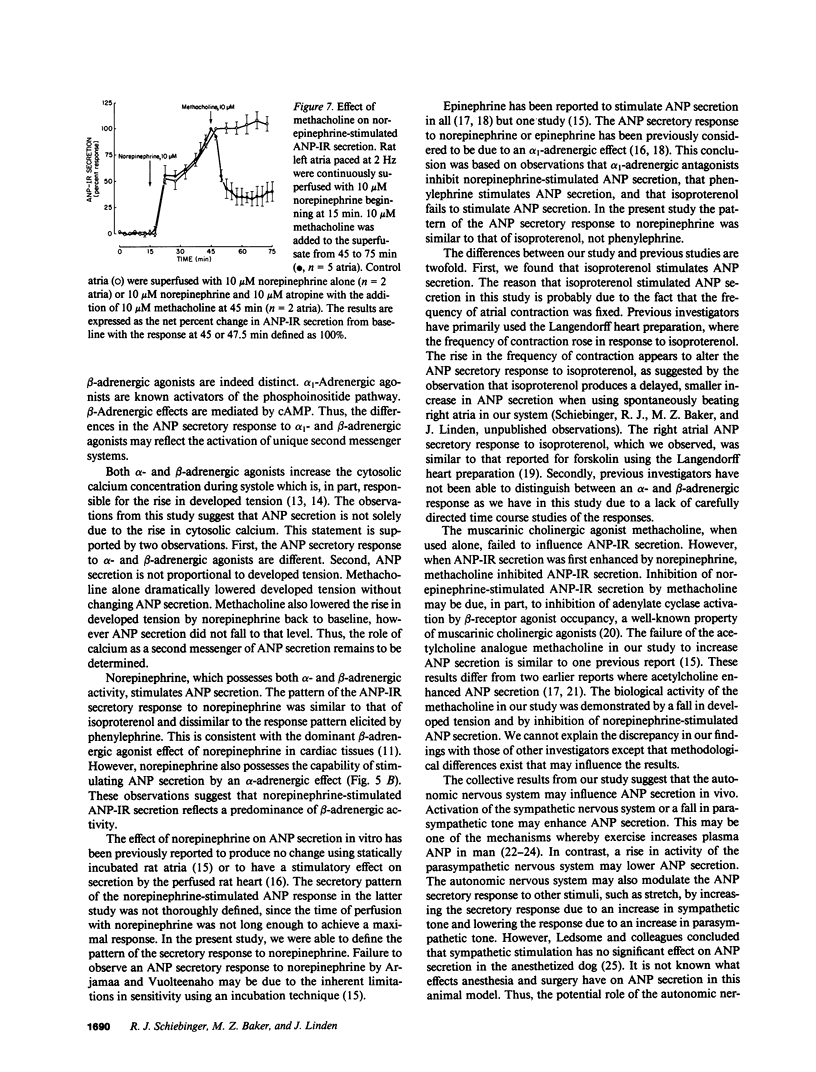
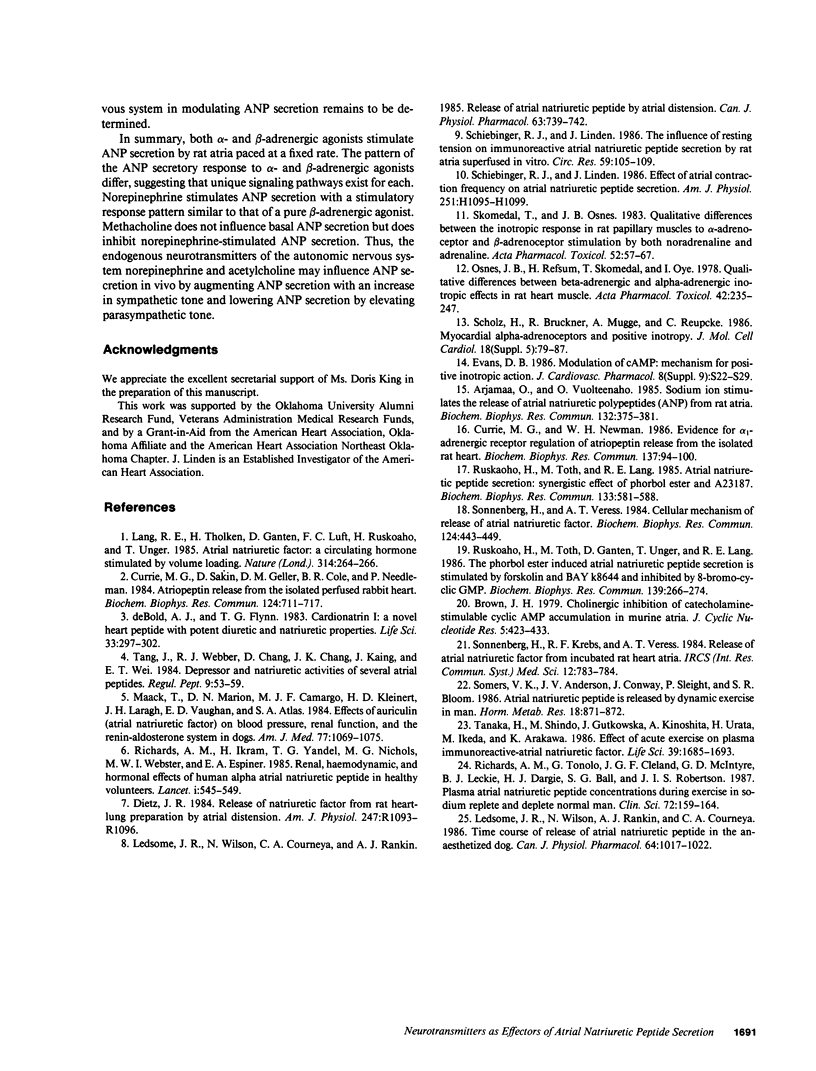
Images in this article
Selected References
These references are in PubMed. This may not be the complete list of references from this article.
- Arjamaa O., Vuolteenaho O. Sodium ion stimulates the release of atrial natriuretic polypeptides (ANP) from rat atria. Biochem Biophys Res Commun. 1985 Oct 15;132(1):375–381. doi: 10.1016/0006-291x(85)91032-0. [DOI] [PubMed] [Google Scholar]
- Brown J. H. Cholinergic inhibition of catecholamine-stimulable cyclic AMP accumulation in murine atria. J Cyclic Nucleotide Res. 1979 Dec;5(6):423–433. [PubMed] [Google Scholar]
- Currie M. G., Newman W. H. Evidence for alpha-1 adrenergic receptor regulation of atriopeptin release from the isolated rat heart. Biochem Biophys Res Commun. 1986 May 29;137(1):94–100. doi: 10.1016/0006-291x(86)91180-0. [DOI] [PubMed] [Google Scholar]
- Currie M. G., Sukin D., Geller D. M., Cole B. R., Needleman P. Atriopeptin release from the isolated perfused rabbit heart. Biochem Biophys Res Commun. 1984 Nov 14;124(3):711–717. doi: 10.1016/0006-291x(84)91016-7. [DOI] [PubMed] [Google Scholar]
- Dietz J. R. Release of natriuretic factor from rat heart-lung preparation by atrial distension. Am J Physiol. 1984 Dec;247(6 Pt 2):R1093–R1096. doi: 10.1152/ajpregu.1984.247.6.R1093. [DOI] [PubMed] [Google Scholar]
- Evans D. B. Modulation of cAMP: mechanism for positive inotropic action. J Cardiovasc Pharmacol. 1986;8 (Suppl 9):S22–S29. [PubMed] [Google Scholar]
- Lang R. E., Thölken H., Ganten D., Luft F. C., Ruskoaho H., Unger T. Atrial natriuretic factor--a circulating hormone stimulated by volume loading. Nature. 1985 Mar 21;314(6008):264–266. doi: 10.1038/314264a0. [DOI] [PubMed] [Google Scholar]
- Ledsome J. R., Wilson N., Courneya C. A., Rankin A. J. Release of atrial natriuretic peptide by atrial distension. Can J Physiol Pharmacol. 1985 Jun;63(6):739–742. doi: 10.1139/y85-121. [DOI] [PubMed] [Google Scholar]
- Ledsome J. R., Wilson N., Rankin A. J., Courneya C. A. Time course of release of atrial natriuretic peptide in the anaesthetized dog. Can J Physiol Pharmacol. 1986 Jul;64(7):1017–1022. doi: 10.1139/y86-173. [DOI] [PubMed] [Google Scholar]
- Maack T., Marion D. N., Camargo M. J., Kleinert H. D., Laragh J. H., Vaughan E. D., Jr, Atlas S. A. Effects of auriculin (atrial natriuretic factor) on blood pressure, renal function, and the renin-aldosterone system in dogs. Am J Med. 1984 Dec;77(6):1069–1075. doi: 10.1016/0002-9343(84)90190-6. [DOI] [PubMed] [Google Scholar]
- Osnes J. B., Refsum H., Skomedal T., Oye I. Qualitative differences between beta-adrenergic and alpha-adrenergic inotropic effects in rat heart muscle. Acta Pharmacol Toxicol (Copenh) 1978 Apr;42(4):235–247. doi: 10.1111/j.1600-0773.1978.tb02195.x. [DOI] [PubMed] [Google Scholar]
- Richards A. M., Nicholls M. G., Ikram H., Webster M. W., Yandle T. G., Espiner E. A. Renal, haemodynamic, and hormonal effects of human alpha atrial natriuretic peptide in healthy volunteers. Lancet. 1985 Mar 9;1(8428):545–549. doi: 10.1016/s0140-6736(85)91207-3. [DOI] [PubMed] [Google Scholar]
- Richards A. M., Tonolo G., Cleland J. G., McIntyre G. D., Leckie B. J., Dargie H. J., Ball S. G., Robertson J. I. Plasma atrial natriuretic peptide concentrations during exercise in sodium replete and deplete normal man. Clin Sci (Lond) 1987 Feb;72(2):159–164. doi: 10.1042/cs0720159. [DOI] [PubMed] [Google Scholar]
- Ruskoaho H., Toth M., Ganten D., Unger T., Lang R. E. The phorbol ester induced atrial natriuretic peptide secretion is stimulated by forskolin and Bay K8644 and inhibited by 8-bromo-cyclic GMP. Biochem Biophys Res Commun. 1986 Aug 29;139(1):266–274. doi: 10.1016/s0006-291x(86)80108-5. [DOI] [PubMed] [Google Scholar]
- Ruskoaho H., Toth M., Lang R. E. Atrial natriuretic peptide secretion: synergistic effect of phorbol ester and A23187. Biochem Biophys Res Commun. 1985 Dec 17;133(2):581–588. doi: 10.1016/0006-291x(85)90945-3. [DOI] [PubMed] [Google Scholar]
- Schiebinger R. J., Linden J. The influence of resting tension on immunoreactive atrial natriuretic peptide secretion by rat atria superfused in vitro. Circ Res. 1986 Jul;59(1):105–109. doi: 10.1161/01.res.59.1.105. [DOI] [PubMed] [Google Scholar]
- Scholz H., Brückner R., Mügge A., Reupcke C. Myocardial alpha-adrenoceptors and positive inotropy. J Mol Cell Cardiol. 1986 Nov;18 (Suppl 5):79–87. doi: 10.1016/s0022-2828(86)80463-1. [DOI] [PubMed] [Google Scholar]
- Skomedal T., Osnes J. B. Qualitative differences between the inotropic responses in rat papillary muscles to alpha-adrenoceptor and beta-adrenoceptor stimulation by both noradrenaline and adrenaline. Acta Pharmacol Toxicol (Copenh) 1983 Jan;52(1):57–67. doi: 10.1111/j.1600-0773.1983.tb01076.x. [DOI] [PubMed] [Google Scholar]
- Somers V. K., Anderson J. V., Conway J., Sleight P., Bloom S. R. Atrial natriuretic peptide is released by dynamic exercise in man. Horm Metab Res. 1986 Dec;18(12):871–872. doi: 10.1055/s-2007-1012460. [DOI] [PubMed] [Google Scholar]
- Sonnenberg H., Veress A. T. Cellular mechanism of release of atrial natriuretic factor. Biochem Biophys Res Commun. 1984 Oct 30;124(2):443–449. doi: 10.1016/0006-291x(84)91573-0. [DOI] [PubMed] [Google Scholar]
- Tanaka H., Shindo M., Gutkowska J., Kinoshita A., Urata H., Ikeda M., Arakawa K. Effect of acute exercise on plasma immunoreactive-atrial natriuretic factor. Life Sci. 1986 Nov 3;39(18):1685–1693. doi: 10.1016/0024-3205(86)90166-9. [DOI] [PubMed] [Google Scholar]
- Tang J., Webber R. J., Chang D., Chang J. K., Kiang J., Wei E. T. Depressor and natriuretic activities of several atrial peptides. Regul Pept. 1984 Sep;9(1-2):53–59. doi: 10.1016/0167-0115(84)90007-7. [DOI] [PubMed] [Google Scholar]
- de Bold A. J., Flynn T. G. Cardionatrin I - a novel heart peptide with potent diuretic and natriuretic properties. Life Sci. 1983 Jul 18;33(3):297–302. doi: 10.1016/0024-3205(83)90390-9. [DOI] [PubMed] [Google Scholar]




